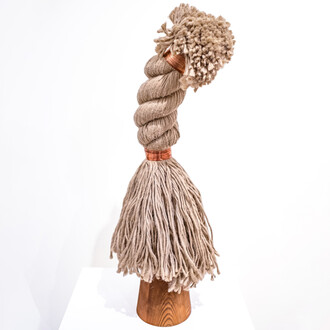Julia Ellen Lancaster's work delves deep into the relationship between humans and the landscape and encourages us to embrace the beauty of difference. 'Deadly Bloom' showcases Lancaster's innovative approach to ceramics, where she experiments with different clay bodies and complex glazing techniques, and employs her signature practice of digging clay from her local area in Thanet. A celebrated ceramic artist known for her distinctive exploration of primitive and otherworldly organisms, Lancaster repurposes previous ceramic experiments, adding layers of complexity to her creations. This intuitive and playful process is fundamentally linked to exploration and making.
Throughout her process, Lancaster frees her mind from constraints of harmony or correctness, allowing her to create without inhibition. This approach enables her to respond intuitively to the work as it evolves, taking unexpected turns and often resulting in a complete departure from the original concept. This evolution is not only an artistic journey but a reflection of the changes that occur in life, with each piece an expression of this human experience.
One of the defining aspects of Lancaster's artistic practice is her allegiance to the Japanese concept of ‘mottainai’, the avoidance of waste. By incorporating salvaged detritus, fragments, and materials rejected from previous projects, she not only eliminates waste but also adds layers of history and embedded time to her creations. Her works, whether fired to extreme heat or left unfired, challenge us to find beauty in the different, the unrecognisable, and the impermanent.
‘Deadly Bloom’ includes a wall piece that acts as a ‘living sculpture’, whereby the colourant used will naturally change and fade over time. It mimics the deterioration induced by human intervention and the eventual demise of fading beauty, with death being the only certainty in life.
Lancaster's sculptures serve as bridges between ancient geological materials and contemporary expression, offering viewers a unique perspective on the interconnectedness of humans and the environment.
Julia Ellen Lancaster works with clay, minerals and rocks, some spanning millions of years of the rock cycle, excavated from different geological sites. The sculptures she makes include salvaged detritus and fragments, rejected from previous incarnations, reused and reassembled. The materials chosen offer a connection to the past, marking and capturing a sense of embedded time. Many of her works are fired to extreme heat, often repeatedly, to create forms that investigate the relationship between humans and the landscape, seen as connected and interchangeable. Some works are however left unfired, risking their eventual swifter demise. In doing so, these works only exist as a digital footprint - their beauty residing in their temporary status, their instability and their transience, so challenging us to find beauty in the different, the unrecognisable and the impermanent.
The works often mimic primitive or other-worldly organisms that embrace the beauty of difference, imagining an intelligent future built from the remains of the past and our present.
Lancaster graduated from MA Environmental Media at the Royal College of Art. Following time spent in Tokyo on a residency at Youkobo Arts Centre in 2018, she was then selected to undertake a residency in St Ives, UK in 2020 as part of the Bernard Leach and Shoji Hamada pottery centenary celebrations, responding to the theme of the Leach as a place of experimentation, in partnership with Porthmeor Studios. In 2021 she was awarded a further residency with Leach Pottery, being one of the first artists to take up a residency at the historically significant Anchor studio, the original home the Newlyn Art School. Prior to this she was responsible for setting up one of the first work/live artists residency schemes in London as well as managing two galleries before returning to her own practice.
Lancaster currently teaches in a professional studio on the South East coast, UK, as well as teaching drawing disciplines concerning space and structure at the Art Academy London. She is a project partner with Powell Cotton Museum, Quex House & Gardens and her work is held in private collections internationally. Since 2022 Lancaster continues to run a series of seminars ‘Clay in Conversation’ in partnership with the Ceramic Research Centre UK, University of Westminster.












